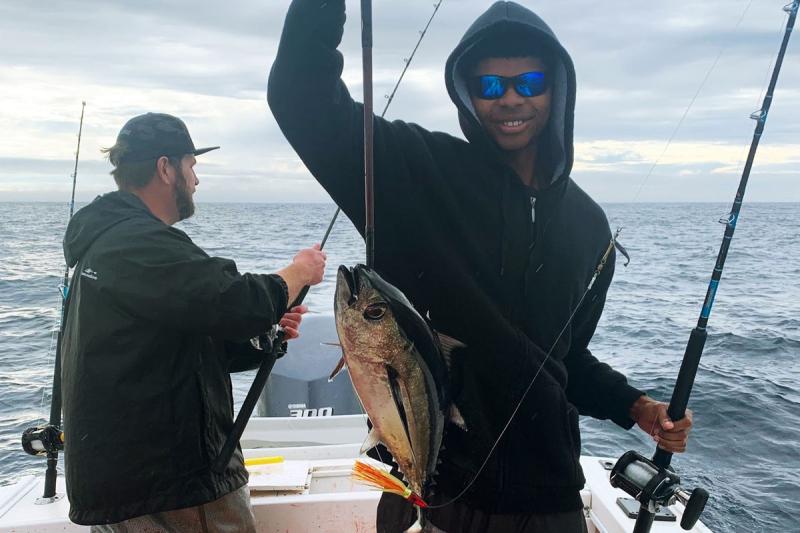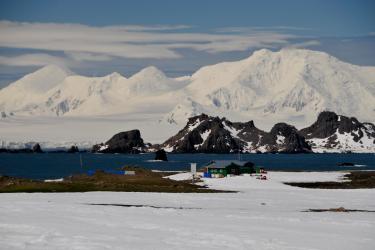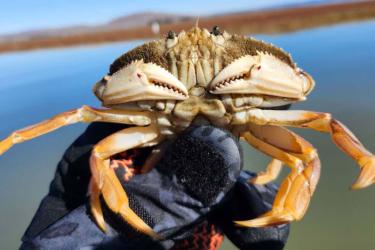Supporting interns helps NOAA Fisheries achieve its mission with a diverse and highly-skilled future workforce in a variety of disciplines. The West Coast Region is proud to continue our participation in NOAA’s undergraduate internship programs. Despite the challenges of working remotely during the pandemic during 2020, we supported interns in the Hollings Preparation Program (HPP) and the Educational Partnership Program with Minority Serving Institutions (EPP/MSI) scholarship program. They completed meaningful projects and established close relationships with West Coast Region mentors in 2020, all virtually.
The HPP seeks undergraduates, particularly from underrepresented backgrounds, who are interested in pursuing NOAA-related fields. This four-to-six week paid internship prepares students to be competitive applicants for the NOAA Hollings Scholarship in their sophomore year. The EPP/MSI scholarship funds two years of undergraduate study for juniors.
We previously profiled several summer 2020 interns from the different programs, reflecting the diversity of internship opportunities available with the West Coast Region. Recently, we sat down with three of these students to hear about their experiences and impressions.
- Noah Jenkins ‒ Humboldt State University ‒ HPP intern in 2019 and current EPP/MSI scholar (Mentors: Matt Goldsworthy, Justin Ly)
- Monica Keim ‒ Alaska Pacific University (Mentors: Shivonne Nesbit, Jennie Franks)
- Daniel Montoya ‒ Humboldt State University ‒ current EPP/MSI scholar (Mentor: Amilee Wilson)
Interviews have been edited and condensed for clarity.
What was the focus of your internship?
Noah: For my HPP internship with NOAA Fisheries in 2019, we were given projects to learn about Endangered Species Act Section 7 consultations. We learned about a wind farm in Humboldt County, California, and then a sedimentation remediation project. We went through the Section 7 consultation just how any NOAA Fisheries professional would. That was definitely a big part of the experience, just learning about NOAA and how the government works as a whole. And how certain agencies interact with others. We considered species that are threatened, like coho salmon, or species that could possibly be listed in the future. Basically you make sure that listed species aren't affected too much while people are doing projects.
For my second EPP internship in 2020, I worked with the National Marine Sanctuaries office out of Monterey. It was virtual, so all through my computer. I worked on a species database. I had known a little bit of information about fish, but this took my knowledge about fish to the next level. I was researching fish that I've never even seen in person. That internship wasn't in person,so I didn't get all the social aspects that I did in the first internship. But it was still influential to my growth as a student and as a future fisheries professional, as I learned about numerous types of fish and how ecosystems work as a whole.

Daniel Montoya in Brookings, Oregon.
Daniel: I did my EPP internship this summer with Tribal Liaison, Amilee Wilson. I was doing tribal outreach through the region’s Communication and External Affairs team. I contacted tribes to create a communications directory. I identified the best point of contact to work with from the tribes on webstories and things like that. I got to attend a lot of meetings that were related to tribes and tribal affairs and see all the different agencies that are in play. I didn't realize how many moving parts there were.
Monica: My EPP internship was focused on addressing challenges in measuring salmon recovery. I conducted interviews and designed a questionnaire to send out to grantees of the Pacific Coastal Salmon Recovery Fund. I spent a lot of time learning how the region’s Protected Resources Division functions and what the purpose and metrics of measuring salmon recovery are with PCSRF. From that, I looked at metrics that might be missing. I asked grantees to talk about how they define recovery. I was exploring why salmon haven't recovered over the last 20 years and new ways to define success for salmon recovery beyond quantitative data. I’m looking for qualitative measurements. What I focused on with my end result was that human connection was really important. So increasing access to fisheries and people's reconnection to salmon, which isn't necessarily quantitative, is vital for salmon recovery.
What was a main highlight of your internship?
Daniel: For me, the main highlight was completing the internship virtually and seeing NOAA at such an unusual time. We were able to see how all the employees were still working virtually and everything was still being completed. There were still all the meetings as usual, things like that; it was really cool to see everything still functioning while the world was upside down.
Monica: I'd say one of my biggest highlights was learning how small the fisheries world is and all of the different agencies that NOAA works with. Another was getting to conduct my own interviews and learn about people's experience and how they ended up where they are. I also got to explore different aspects of fisheries that I may want to work on in the future. I've done a previous internship with River Restoration Northwest, and I was able to reconnect with someone that I met through them. One of my mentors was so connected, it was crazy. She knew everyone. She knows my previous boss from the Alaska Department of Fish and Game.
With my internship, I went into it not knowing much about policy or management. I have a taste of that now, and I'm interested in getting more involved. I also wasn't comfortable with public speaking or writing, getting into scientific communication. That is something that I want to work on more. Being able to develop my own message, carry it out into scientific communication through the presentations, and then getting to dabble in working on a web story. It showed me a lot of different components of research and the scientific communication aspect of it.
Daniel: It definitely helped me shape my career path, like what field of fisheries I wanted to go into. I was able to speak to some people in stock assessment and see how the day-to-day of their job is and see if that's what I wanted to do.
Like Monica was saying, I was more confident in reaching out to people, so I took that initiative to reach out to NOAA employees and speak to them about their position. And then I realized how easy it was, and they [introduce] you to people that they know that are in a position of interest. Before I was kind of not confident in reaching out. I feel I'm more confident in my writing skills, communication, sending an email, and having faith that they'll respond.
Noah: During the HPP internship, we gave presentations to the office about things we were doing. It helped with the public speaking a lot. And we learned so much about Section 7 consultations, about informal and formal consultation. We would make road maps about how to do a consultation. We got to learn what the people in the office were actually doing.
While the first internship (HPP) taught me how to speak publicly, the second internship (EPP) taught me how to convey that information more effectively. It goes hand in hand. You can be intellectual and speak in a certain way that people won't understand. While working with the species database, I was able to convey information to the public in an understandable way. That way they could learn about species that live in the ocean and that are fished for commercially without using super scientific terms.
What are your impressions of NOAA Fisheries?
Noah: The first time I started working with NOAA Fisheries was like a dream to me because almost every single person in the office fished. I could pretty much talk to every single person about fishing. A lot of people in the office were like minded, they just truly cared about fish and wanted to protect them. I found, while working with NOAA Fisheries, that sometimes you have to work through difficult situations. Sometimes outside things can come in the way and make your work kind of difficult. You can run into that with any kind of job.

Monica Keim at Ozone climbing area, Washougal, Washington.
Monica: I wanted to build off what Noah and Daniel said in the highlight question. Daniel mentioned that it was really easy to connect with people, and people wanted to introduce you to other folks they know. I could feel the passion coming from NOAA Fisheries people. When they knew you were excited about something, they wanted to talk about it, and they knew someone else who would want to talk to you, too. When I was developing a web story or finding a way to talk about my internship past the end of the program, they connected me with others who could help me. You don’t find that level of excitement in a lot of places. You can really tell when people are just talking to you because they have to, compared to when they want to.
Daniel: Yeah, I feel like NOAA Fisheries is a really small work environment, even though there are offices throughout the United States. It's like a community-based office because everyone knows each other. And from my impression this summer, just reaching out to the first person was just like a domino effect. I got to connect with so many people. It was inspiring. Everyone was there with a smile, and it just seemed like a really good time. It makes me interested in working at NOAA Fisheries. I'm sure that all these people are very happy about not only what they're doing, but where they're working, who they're working with. There's so many factors besides just going to your job, performing, and leaving.
How important was your mentor to your internship?
Noah: I learned so much from Matt and Justin. During the time I started doing the internship, Matt was handling so many consultations, so I was grateful that he was willing to take on an intern. I learned tenacity from him. It was interesting to watch him work through difficult things; it taught me about not giving up, and working through the issue you may have. It was super cool to get to know Matt. I would even say we're really good friends now. We go fishing together.
Monica: I don't think it would have been nearly the same if I hadn't had the mentors that I did. Jennie and Shivonne were incredibly approachable, and they both had really different things that they brought to the table. Without those connections, I don't think that I would feel the same about my experience. I think it's incredibly important to maintain those relationships and think about how you can help people and how you can share information. That really is through friendship and developing partnerships. Shivonne helped me feel more comfortable reaching out to people. And Jennie is so good at listening to people from their perspective, giving people the benefit of the doubt, and learning how to compromise. I think that's something I really needed help with. She helped me understand that other people have experience that is true to them and to listen to that and understand where you can come together, rather than what's driving you apart.
What about the future? What are you thinking of for internships or next steps after the school year?
Monica: For the EPP program, we have two years of the internship. This past summer was our first one, and we're currently applying for next summer. My mentors helped me develop my own project through the NOAA Fisheries office in Boise, so I'll do that next summer. We're doing academic research during the school year. After next summer, we’re participating in a public service project under the EPP/MSI scholarship.
Noah: For the second year of the EPP internship, I am trying to figure out what office I'm going to work with and what specifically I want to do. I'm still trying to figure out what I want to do, for work in general. I definitely enjoyed working for NOAA.
Thank you to all of the interns and mentors. The West Coast Region’s Deputy Regional Administrator, Scott Rumsey, stresses that internship programs contribute to us achieving our mission and advance a diverse and inclusive fisheries workforce.


